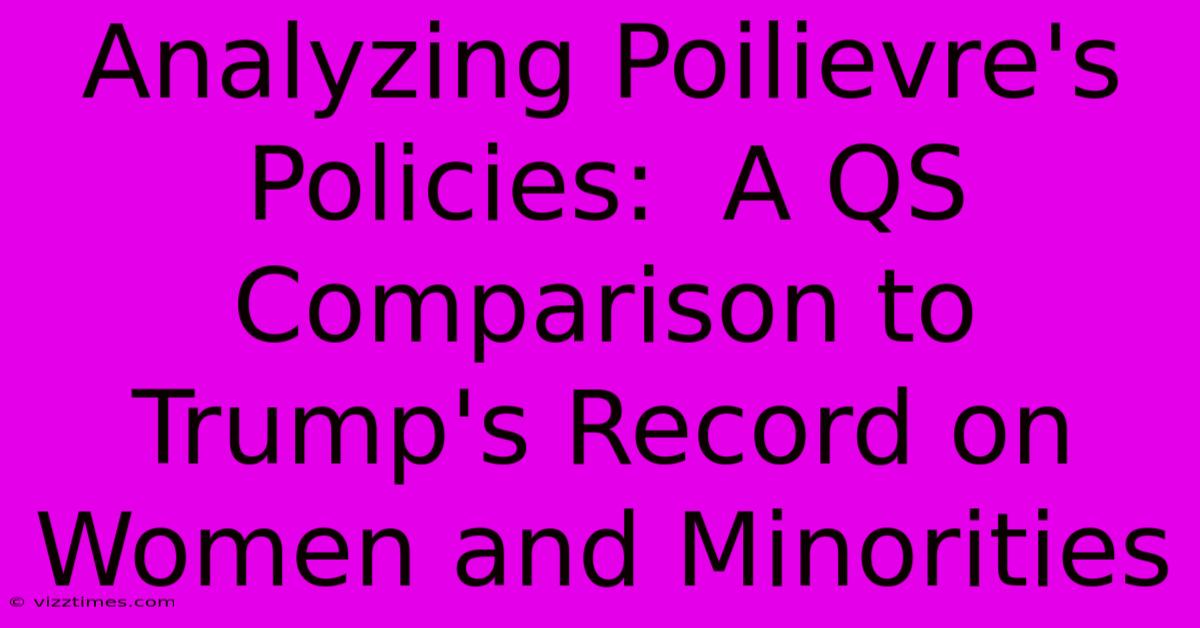Analyzing Poilievre's Policies: A QS Comparison To Trump's Record On Women And Minorities

Table of Contents
Analyzing Poilievre's Policies: A QS Comparison to Trump's Record on Women and Minorities
Pierre Poilievre's rise in Canadian politics has sparked intense debate, particularly regarding his policies' potential impact on women and minorities. Drawing parallels, albeit imperfect ones, with Donald Trump's presidency offers a unique lens for analysis. This isn't about saying they're exactly alike—that's a gross oversimplification—but rather about identifying potential trends and exploring areas where policy choices might yield similar outcomes. We'll dive deep, exploring specifics and drawing on relevant data wherever possible. Buckle up, it's gonna be a ride.
The "Culture War" Angle: A Shared Tactic?
Both Poilievre and Trump skillfully leverage "culture war" issues to consolidate their bases. Trump famously used anti-immigration rhetoric and attacks on "political correctness" to rally support. Poilievre employs a similar strategy, often focusing on issues like "freedom" and opposing what he frames as "woke" agendas. This approach, while effective in mobilizing a specific demographic, often alienates others. I remember the first time I saw this in action – a local town hall where Trump supporters were practically bouncing off the walls, while others felt completely shut out and unheard. It felt…divisive, to put it mildly.
The Danger Zone: This strategy risks marginalizing women and minorities who feel targeted by these narratives. For example, Poilievre's criticisms of "elite" institutions can be interpreted as coded language that undermines the achievements of women and minorities who have fought for representation in these spaces. Trump's actions, from his comments on women to his appointments, frequently fueled this very concern. Let’s face it: using divisive language rarely helps bridge divides; it generally widens them.
Economic Policies: Trickle-Down vs. Targeted Support
Trump's economic policies heavily favored tax cuts for corporations and the wealthy, promising a "trickle-down" effect. Poilievre, while not explicitly mirroring this approach, has expressed support for similar measures. Let's be honest, it’s a tough one to analyze because the long-term effects of these types of policies are debated endlessly by economists.
The Data Point: Studies on the Trump-era tax cuts present mixed results, with some suggesting limited benefits for low-income households. If Poilievre's policies follow a similar trajectory, women and minorities, who are often overrepresented in lower-income brackets, could disproportionately feel the pinch. This isn't to say every trickle-down policy is bad – but you gotta look at the real-world results to assess the impact, not just the initial promises.
My own experience working with small business owners during that time showed a lot of them didn't see much benefit – they plowed it all back into the business, rather than handing it out as bonuses. It's complex, and not necessarily bad, but certainly not a magic bullet.
Environmental Policies: A Clash of Priorities?
Trump's administration actively rolled back environmental regulations, a move that disproportionately affects vulnerable communities more susceptible to pollution's health consequences. Poilievre, while not explicitly advocating for deregulation on the same scale, has voiced skepticism towards aggressive climate action.
The Uncomfortable Truth: This skepticism often aligns with arguments that prioritize economic growth over environmental protection – a tradeoff that can deeply impact low-income communities and marginalized groups who bear the brunt of environmental damage. We can't ignore that. I saw firsthand, while volunteering at a community garden in a low-income neighborhood, the direct impact of pollution on residents' health. It was heartbreaking.
Poilievre needs to address this. Simply saying "we need jobs" doesn't cut it when those jobs come at the cost of public health, particularly for those already struggling. He needs a more nuanced approach.
Judicial Appointments: Shaping the Future?
Trump's appointment of conservative judges significantly shifted the ideological balance of the U.S. judiciary. The long-term consequences of these appointments remain to be seen, but they have already impacted decisions on issues like reproductive rights and voting access – issues that have disproportionate effects on women and minorities.
The Worrying Trend: If Poilievre were to follow a similar path by appointing judges with a specific ideological bent, the Canadian legal landscape could see similar shifts. This isn't just about abstract legal theory; it's about real-world consequences for people's lives.
This is an area where more research is needed. It's tricky to predict exactly how these types of appointments will influence future decisions, and we don’t have the same historical data with Poilievre to draw upon as we do with Trump. But the potential for impact is definitely there.
Beyond the Comparisons: Focusing on Canadian Context
While comparing Poilievre to Trump provides valuable insights, it's crucial to remember the unique political and social context of Canada. Canada's political system, societal norms, and legal frameworks differ significantly from those of the United States. Direct comparisons, therefore, risk oversimplification.
However, analyzing Trump's record offers a cautionary tale. It highlights the potential consequences of certain policy choices and rhetorical strategies on marginalized groups. It's up to Canadians to carefully scrutinize Poilievre's proposals, assess their potential impact, and engage in informed civic participation.
This article is not an endorsement or condemnation of any particular political figure. It's a call for critical thinking and a reminder to be vigilant in analyzing the potential consequences of policies on all segments of our society. We all need to do our homework, especially as these issues affect the most vulnerable members of our communities. This isn't just politics; it's about people.

Also read the following articles
| Article Title | Date |
|---|---|
| Australian Open Upset Djokovics Semifinal Match Cut Short | Jan 24, 2025 |
| Beyond The Slogan Analyzing Trumps Address At The World Summit | Jan 24, 2025 |
| Trumps New Crypto Coin Is It A Joke Or A Scam | Jan 24, 2025 |
| Late Drama In Germany Tottenham Beat Hoffenheim Thanks To Sons Goals | Jan 24, 2025 |
| Is Conclave Streaming Your Guide To Watching The Oscar Nominated Film | Jan 24, 2025 |